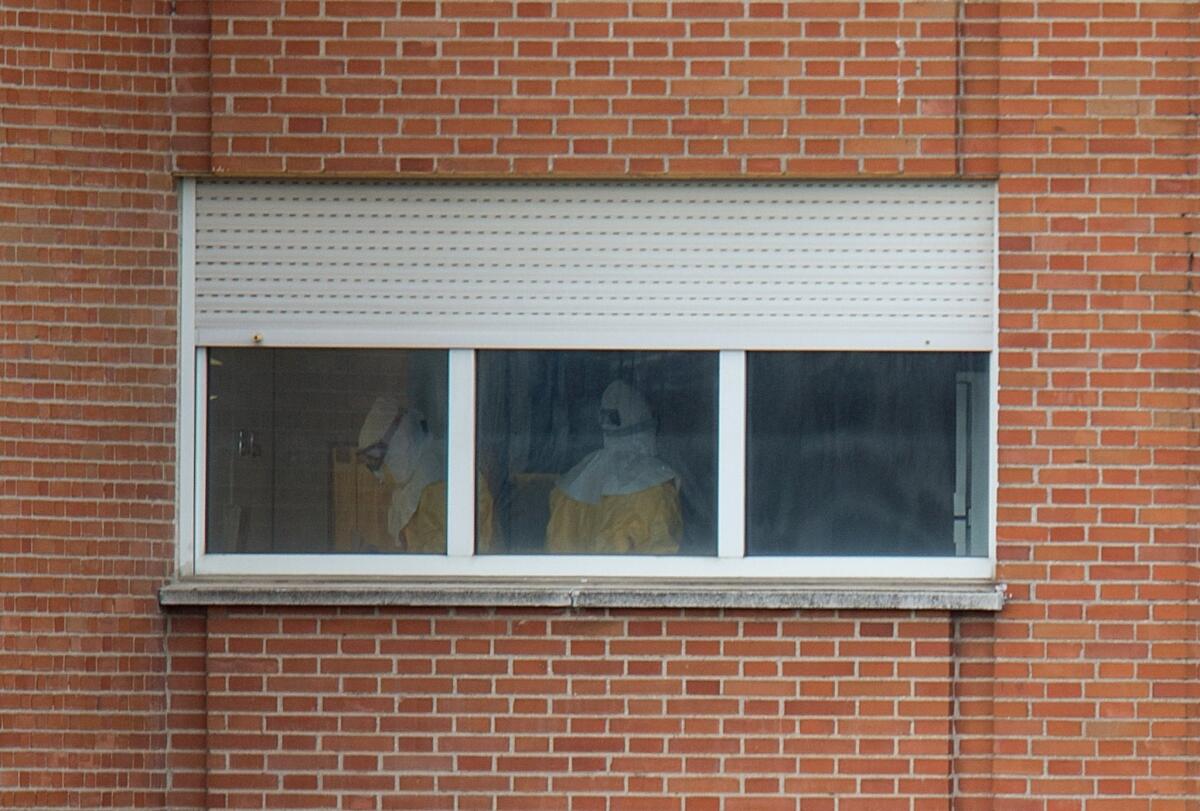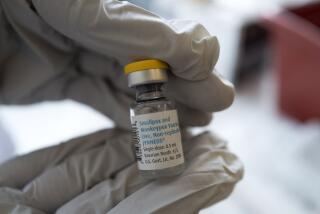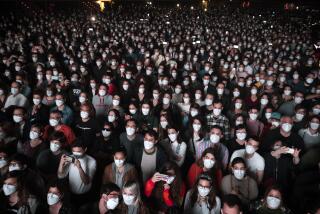Spain’s health system accused of safety lapses amid Ebola scare

- Share via
Reporting from Madrid — The health of a Spanish nursing assistant infected with Ebola deteriorated Thursday, her doctors and brother said, as reports rolled in of suspected safety blunders that may have exposed more medical personnel, patients and members of the public to the deadly virus.
The patient’s brother, Jose Ramon Romero, told reporters that relatives had been asked to come quickly to Carlos III Hospital in Madrid and that “there isn’t much hope, that it’s complicated.” He said his sister had been intubated and was on a ventilator.
Meanwhile, three more medical workers were quarantined at the same facility Thursday for possible exposure to the Ebola virus, bringing the total number hospitalized to seven. They include the infected healthcare worker’s husband, co-workers and a beautician who waxed the patient’s legs after she became feverish and infectious.
Teresa Romero Ramos, the first person known to have contracted Ebola outside Africa in the current outbreak, was part of the medical team that cared for two infected Spanish missionaries who were evacuated from West Africa for treatment in August and September. Neither of them survived.
Doctors said Romero may have inadvertently touched her face with a gloved hand after exiting one of the priests’ hospital rooms. More than 80 other people are being monitored for symptoms of Ebola, with their temperatures being taken twice daily.
Spain’s brush with Ebola has highlighted some of the challenges that Western nations face in readying their healthcare systems to handle possible outbreaks of the virus that is spreading swiftly through West Africa. The World Health Organization has said that it expects more Ebola cases to turn up in Europe, given the ease and volume of modern travel. The United States and Britain have said that they will begin screening for the virus at some airports.
More than 3,800 people are believed to have died of Ebola in West Africa, where fragile public health systems have been overwhelmed with the sick and the dead. Healthcare workers are particularly at risk because the virus is spread through contact with the bodily fluids of symptomatic patients.
Those hospitalized in Spain on Thursday included two doctors and a nurse at a medical facility in Alcorcon, a southern suburb of Madrid, where Romero first sought treatment Monday after experiencing a fever for a week.
None of them were reported to have developed symptoms of the virus. But Dr. Juan Manuel Parra, an emergency room doctor, said that the protective suit he was required to wear when examining Romero didn’t fit properly, and that he could have been exposed to the virus.
“The sleeves of the suit were too short for me,” Parra told Spain’s El Pais newspaper via text message from the isolation ward into which he checked himself Thursday morning.
Romero waited in the Alcorcon emergency room for eight hours Monday and was not immediately isolated, potentially exposing other patients to Ebola before she was transferred in a plastic capsule in an ambulance motorcade to the Carlos III Hospital.
Both Romero and Parra have said that they learned she had tested positive for Ebola from the media, rather than from laboratory officials. The nursing assistant told a Spanish TV station that she saw a news headline on her phone while in isolation awaiting her test results.
There were also reports Thursday that the ambulance used to transport Romero to the Alcorcon hospital was not sterilized before it was used seven more times, even though she had told the dispatcher beforehand that she suspected she might have Ebola. They emergency crew said that they wore plain clothes and were not given biohazard suits when they collected her.
A video circulating online purported to show a member of a disinfection team exiting Romero’s apartment, taking off a biohazard suit and dumping it on the pavement, alongside a swimming pool and walkways inside the apartment complex. The video is believed to have been recorded by one of Romero’s neighbors.
Many medical personnel blame the apparent safety lapses on recent budget cuts in the public health sector.
Nurses and doctors across the Spanish capital rallied for a third day Thursday, in pouring rain, calling for an overhaul of Ebola protocols and the resignation of the Spanish health minister, Ana Mato. The hashtag #AnaMatoDimision -- “Ana Mato Resignation” -- was trending on Twitter in Spain.
The country’s SAE nurses’ union said an unknown number of nurses and technicians had resigned this week over instructions to care for suspected Ebola patients in quarantine. Spanish media quoted recently laid-off hospital workers as saying that they had been offered 15-day “Ebola cleanup contracts.”
The head of another nurses’ union, Maximo Gonzalez, told Spanish radio that his group was collecting “hundreds” of reports of Ebola protocols not being followed correctly. “There is a shocking chain of errors,” he said. “Enormous.”
The reports have spread fear in Romero’s Alcorcon neighborhood, where some residents were seen wearing surgical masks, even though Ebola is not known to be an airborne disease. The woman’s dog, Excalibur, was euthanized late Wednesday as a precaution -- prompting protests from animal lovers and activists who urged the Spanish government to first test the pet for Ebola.
“When I see people wearing those masks, and I hear no public advisories from the government, it makes me really scared,” said Veronica Blanco, 25, who was hailing a taxi in a another Madrid neighborhood. “I’m not taking public transport anymore. I try not to touch anyone in the street, or share bottles or utensils with people at work. You don’t know what could happen.”
Stock prices in European travel companies took a hit this week over fears that Ebola could hurt tourism.
In parliament Wednesday, Prime Minister Mariano Rajoy urged the public to “be vigilant but stay calm.”
“What I’d ask is that we let the professionals do their job. Have confidence in them,” he said. “They’re some of the best in the world.”
Times staff writers Christine Mai-Duc and Alexandra Zavis in Los Angeles contributed to this report.
More to Read
Sign up for Essential California
The most important California stories and recommendations in your inbox every morning.
You may occasionally receive promotional content from the Los Angeles Times.










